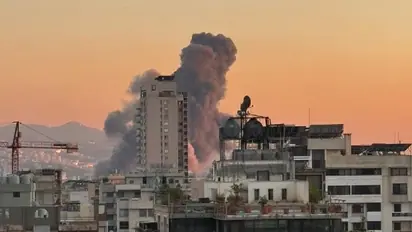ELIMINATED! Israel confirms killing of Hezbollah missile unit commander, his deputy in Lebanon airstrike

Synopsis
Israeli military confirmed that it had carried out a targeted airstrike early Saturday, eliminating Muhammad Ali Ismail, the Commander of Hezbollah’s Missile Unit in southern Lebanon, along with his deputy, Hussein Ahmad Ismail.
In a major escalation of its military campaign, the Israeli military confirmed that it had carried out a targeted airstrike early Saturday, eliminating Muhammad Ali Ismail, the Commander of Hezbollah’s Missile Unit in southern Lebanon, along with his deputy, Hussein Ahmad Ismail. The airstrike marks a significant blow to Hezbollah, an Iran-backed militant group based in Lebanon, and comes amid rising tensions between Israel and Hezbollah forces.
In a statement released by the Israeli Defence Forces (IDF), it was confirmed that Muhammad Ali Ismail had been responsible for orchestrating numerous attacks on Israeli territory. These included a series of recent rocket launches and missile strikes aimed at key locations within Israel. The IDF’s statement highlighted the precision and strategic importance of the operation, describing the airstrike as a decisive blow against Hezbollah’s missile infrastructure.
The airstrike follows a similar operation that resulted in the death of Ibrahim Muhammad Qabisi, the head of Hezbollah's Missiles and Rockets Force, and several other high-ranking commanders. According to Israeli officials, the targeting of senior Hezbollah leaders is aimed at disrupting the group’s military capabilities, especially its missile and rocket operations, which have been a significant threat to Israel's security.
The IDF’s official statement, posted on social media, confirmed the successful elimination of the two Hezbollah leaders: "Muhammad Ali Ismail, the Commander of Hezbollah’s Missile Unit in southern Lebanon, and his deputy, Hussein Ahmad Ismail, were eliminated in a precise IAF strike," it said.
"Ali Ismail was responsible for directing numerous terrorist attacks against the State of Israel, including the firing of rockets toward Israeli territory and the launch of a surface-to-surface missile toward central Israel on Wednesday," the IDF added.
"This follows the elimination of the terrorist Ibrahim Muhammad Qabisi, Head of Hezbollah's Missiles and Rockets Force, as well as other senior commanders of this unit," the statement concluded.
These strikes are part of a wider offensive by Israel against Hezbollah's operations in Lebanon. On Friday, Israeli forces confirmed that they had also targeted Hezbollah's headquarters in the Lebanese capital, Beirut. The airstrike triggered a series of massive explosions that rocked the city, devastating several high-rise apartment buildings.
According to Lebanon's health ministry, at least six people were confirmed dead, and 91 others were injured in the attack. Rescue operations are still underway, and authorities fear the death toll could rise as more bodies are discovered beneath the rubble. The explosions, described as the largest to hit Beirut in the past year, have escalated the already tense situation in the region, bringing both Israel and Hezbollah closer to the brink of an all-out war.
There are unconfirmed reports that Hassan Nasrallah, Hezbollah’s leader, may have been one of the targets in the strike on the headquarters in Beirut. While no official statement has been issued by Hezbollah regarding Nasrallah's whereabouts, a report from the Associated Press (AP), citing a US official familiar with the operation, suggested that Nasrallah had been the primary target of the Israeli airstrike. The Israeli military has neither confirmed nor denied this, adding to the uncertainty surrounding the attack.
In response to the escalating situation, Israeli Prime Minister Benjamin Netanyahu cut short his visit to the United States and returned to Israel to oversee the military operations. Netanyahu, who addressed the United Nations earlier in the week, had vowed to intensify Israel's campaign against Hezbollah. In his speech, he stressed Israel's commitment to neutralizing the militant group’s leadership and preventing further attacks on Israeli territory.
The continued airstrikes and military operations have dimmed prospects for an international ceasefire, with growing concerns that the conflict could spiral into a larger regional war. Diplomatic efforts by the United Nations and other international players to broker a ceasefire have thus far failed to de-escalate the conflict.
Check the Breaking News Today and Latest News from across India and around the world. Stay updated with the latest World News and global developments from politics to economy and current affairs. Get in-depth coverage of China News, Europe News, Pakistan News, and South Asia News, along with top headlines from the UK and US. Follow expert analysis, international trends, and breaking updates from around the globe. Download the Asianet News Official App from the Android Play Store and iPhone App Store for accurate and timely news updates anytime, anywhere.